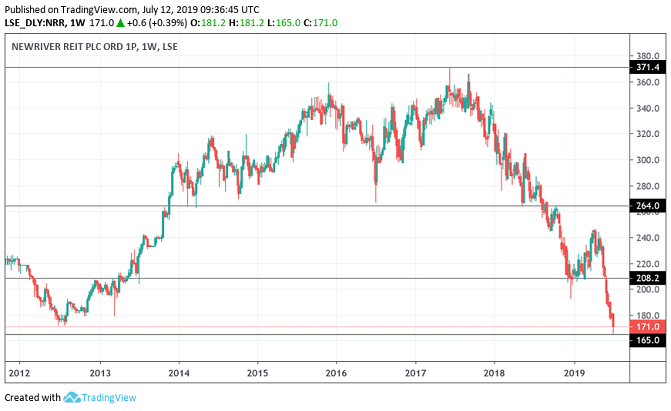Stockwatch: Is value appearing in this over-sold sector?
There's a bull and bear case for this half-a-billion-pound business depending on risk appetite.
12th July 2019 10:53
by Edmond Jackson from interactive investor
Share on
There's a bull and bear case for this half-a-billion-pound business depending on risk appetite.

Is it time to buy the bombed-out mid-cap shares in the NewRiver Real Estate Investment Trust (LSE:NRR)? Not only have they suffered a self-reinforcing bias of falling retail values (see the hefty negative value adjustments in the table) and poor sentiment, but has also become a forced sale by Woodford Investment Management amid its redemptions crisis.
Yesterday lunchtime it was announced that Woodford had reduced his stake from 11.84% to below 5%. Hedge funds have also jumped aboard the downtrend with 7.4% of NewRiver's share capital sold short – probably more overall, as this just represents traders over 0.5%.
The Woodford sale perhaps removes a near-term overhang, so it's tempting to see the stock as attractive at 170p – a 35% discount to net asset value (NAV), as of the last accounts to 31 March, according to European Public Real Estate Association (EPRA) methodology.
It's important to distinguish underlying value judgments from market technical (behavioural/sentiment) factors. Even if the medium to longer-term outlook for a share's fundamentals remain challenging, it is possible that the market price can rise - especially if enough short sellers have joined the party to exploit Woodford's grief as well as tough times in retail property - and present a buying opportunity.
Although the chart for changes in disclosed short positions shows a fairly steady rise over two years, a 1.5% spike in early June coincides with Woodford's woes.

Source: TradingView Past performance is not a guide to future performance
Fundamental reasons for the rise in shorting
You could say the more obvious link is with lumpy negative valuation adjustments in the accounts, and, although cash generated from operations is pretty stable in a high £60 million area (mid-£50 million after working capital changes), the last two years' dividend costs have each been over £60 million.
In the last year, balance sheet cash has run down from about £116 million to £27 million; thus, an implied 12%-plus yield at the current share price probably isn't realistic. Before the Woodford fiasco broke, NewRiver had about 6% of its equity disclosed out on loan, versus a maximum of 3% at peer Hammerson (LSE:HMSO) that's now reduced to 0.7%. So, the hedge funds do appear to believe in more adverse risk/reward at NewRiver.
NewRiver's debt profile has risen 10% to £502.7 million, structured exclusively long-term and which generated £18.7 million finance costs last year relative to £68 million operating profit (albeit a £21.5 million loss after fair value adjustments).
Not what you ideally want to see, going into a possible downturn, although it is unlikely to mean real financial stress. Management contends its shopping centres and retail parks have tenants in relatively resilient areas of retail, such as grocery, convenience stores, value clothing, health & beauty and discounting. In fairness, retail occupancy remains very strong at 95% if slightly down on 97% two years ago, and few people may appreciate visiting centres/parks with much boarded-up frontage. Pub occupancy figures are slightly better.
I see the chief financial risk as more likely a dividend cut to rebalance payouts more prudently, allowing for debt repayments if the UK does go into recession, rather than being forced to sell properties at a less sensible time.
NewRiver has seemed quite the typical listed plc, trying to achieve everything by way of growth and shareholder returns which now look very full in context. The total dividend in respect of the last financial year to 31 March was 21.6p per share, a 3% year-on-year rise and 84% covered by underlying funds generated from operations.
| NewRiver REIT - financial summary | ||||
|---|---|---|---|---|
| year ended 31 Mar | 2016 | 2017 | 2018 | 2019 |
| Gross income (£ million) | 60.8 | 96.1 | 106 | 125 |
| Fair value adjustments (£m) | 19.5 | -19.4 | -12.9 | -88.2 |
| Operating profit inc valuation change (£m) | 81.7 | 56.1 | 63.1 | -21.5 |
| IFRS3 pre-tax profit (£m) | 69.5 | 37.4 | 46.9 | -36.4 |
| IFRS3 earnings per share (p) | 38.9 | 15.4 | 16.0 | -12.1 |
| Retail occupancy (%) | 96.0 | 97.0 | 96.5 | 95.2 |
| Pub occupancy (%) | 96.0 | 97.0 | 99.0 | 97.9 |
| Dividends per share (p) | 18.5 | 23.0 | 21.0 | 21.6 |
| Covered by earnings (x) | 2.1 | 0.7 | 0.8 | |
| Balance sheet cash (£m) | 114.1 | 46.0 | 115.8 | 27.1 |
| EPRA net asset value per share (p) | 295 | 292 | 292 | 261 |
Source: Company REFS
Woodford fiasco may be a distraction in a long-term downtrend
Hedge funds remaining short are likely doing so as a means to insure their portfolios against Brexit risk, declining retail property value being one key means. NewRiver may be justified in saying it can retain high occupancy levels but, if fair value adjustments continue to ratchet down and the company also cuts its dividend, then overall risk may remain on the downside.
Medium-term tactical 'shorters' may therefore ride out any further rise from a 165p low to about 170p now that the Woodford stake is substantially placed elsewhere.
For example, I would note, Marshall Wace with a 0.5% short position as of 24 June, which has a good (though by no means perfect) record of judging medium-term downside risk – it has 41 short positions in challenged UK equities currently.
Be aware, both the stock market and underlying asset value trend has been pretty strongly downwards in the last two years. After reaching highs of around 360p over 2016 to 2017, NewRiver fell progressively to 208p during the late 2018 bear market. It recovered to 243p with the New Year improvement in risk appetite, hence it is quite easy to see the slide to 165p as overdone – it relates chiefly to that Woodford overhang now resolved.
I incline to look past this to underlying NAV which is down 10.6% on March 2018 and, given the wider context of retail asset values, does indeed require a discount for risk in the share price, taking a two-year view.
Asset values broadly have benefited from a decade of monetary stimulus and Brexit may pop that bubble. The question is, to what level of NAV discount is justified: strategic short-sellers likely anticipate further double-digit falls.
Conversely, it is also possible that replacing the UK Prime Minister represents a low point both in the Brexit process and consumer/business sentiment; in which case the Woodford sale is indeed a classic "get me out!" capitulation by a fund, at the low. Not even Marshall Wace can know if that is the case. Ultimately, they are taking a view like everyone else.
On 4 June, Baroness Margaret Ford, NewRiver's non-executive chair, bought £50,000 shares at 195p having taken up this role last October.
Risk lovers may like to test a speculative buying case
For now, it's a tricky balance where, yes, the downtrend can continue both in underlying fundamentals and stock sentiment, but is potentially at an inflection point too given the apparent consensus of how things can only get worse.
If you have risk appetite, consider testing the situation with small purchases – averaging in according to whether the stock and its reporting affirms the 'buy' case. If that happens, you can then increase your position incrementally, but do decide on a stop-loss level and stick to it. Given the uncertainties of Brexit for retail property values, this can only be described as a speculative buying view.
If you are a more typical UK private investor - already exposed to domestic UK equities and sterling assets generally – and wondering how to start offsetting risk lest a consumer recession materialises: Avoid.
Edmond Jackson is a freelance contributor and not a direct employee of interactive investor.
These articles are provided for information purposes only. Occasionally, an opinion about whether to buy or sell a specific investment may be provided by third parties. The content is not intended to be a personal recommendation to buy or sell any financial instrument or product, or to adopt any investment strategy as it is not provided based on an assessment of your investing knowledge and experience, your financial situation or your investment objectives. The value of your investments, and the income derived from them, may go down as well as up. You may not get back all the money that you invest. The investments referred to in this article may not be suitable for all investors, and if in doubt, an investor should seek advice from a qualified investment adviser.
Full performance can be found on the company or index summary page on the interactive investor website. Simply click on the company's or index name highlighted in the article.
Disclosure
We use a combination of fundamental and technical analysis in forming our view as to the valuation and prospects of an investment. Where relevant we have set out those particular matters we think are important in the above article, but further detail can be found here.
Please note that our article on this investment should not be considered to be a regular publication.
Details of all recommendations issued by ii during the previous 12-month period can be found here.
ii adheres to a strict code of conduct. Contributors may hold shares or have other interests in companies included in these portfolios, which could create a conflict of interests. Contributors intending to write about any financial instruments in which they have an interest are required to disclose such interest to ii and in the article itself. ii will at all times consider whether such interest impairs the objectivity of the recommendation.
In addition, individuals involved in the production of investment articles are subject to a personal account dealing restriction, which prevents them from placing a transaction in the specified instrument(s) for a period before and for five working days after such publication. This is to avoid personal interests conflicting with the interests of the recipients of those investment articles.